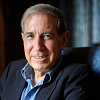It's About the Syrian People
I am not Syrian, but neither am I a mere bystander to the tragedy that has befallen that tortured country. Almost daily I deal with the complex reactions of diverse segments of the Syrian American community—their pain and anguish, their fear or anger. For me, therefore, the story of Syria is about its people and finding a way to bring them together to rebuild their common sense of community and purpose.
On a number of occasions, I have visited with Syrian Americans discussing, well into the night, this horrific war. Some of the groups with whom I have met want nothing more than to see the regime beaten and removed from power. And rightly so. They come from cities and villages that have been destroyed by the regime's heavy artillery or overrun by its armed forces. In too many instances, they tell personal stories of how members of their immediate families have been killed, wounded, or forced to flee their homes and their livelihood.
I have also met with those who are afraid. They are, themselves, a diverse group. Some hail from Syria's secular business and professional middle class, who weep for the destruction of the life and country they had known and ask, "what has all this destruction accomplished?" Others are members of vulnerable minority communities who fear for the survival of their families and friends at the hands of what they see as intolerant extremists who are wrecking havoc and threatening to impose their will on Syrian society. They are afraid. And rightly so.
These are the divisions that exist in Syria and they divide the Syrian American community as well. I see it in every community I visit, and I hear it every day.
The backdrop to this sorry state of affairs is, at this point, too well known. On the one hand, there is a brutal and dictatorial regime willing to use all of the elements of power it possesses to maintain its rule. On the other hand, there is an opposition that is dangerously fragmented. They are composed of competing elements: from moderate reformers seeking to create a more open society to ruthless terrorists who have, like the regime they are fighting, committed atrocities, while in between are countless armed groups and gangs unconnected to any authority.
There is, of course, an additional dimension to this horror that has seen Syria become a proxy war between regional powers who are fueling and arming the conflict.
But strip away all these layers, and there are the Syrian people—the victims of this war.
From the beginning it was clear that the only resolution to the Syrian conflict was a negotiated solution that would lead to the end of the regime's absolute control over state power giving way to a more open and democratic society. If this goal was difficult at the outset, it has only become more difficult today. As the death toll has continued to rise, with each new atrocity, and as new and more lethal groups have emerged on the scene, the sides have become hardened in their resolve to fight unto death.
Following the US-Russia agreement earlier this year to convene a Geneva II meeting to bring the combatants to the table to talk, there appeared to be hope that we were on the verge of finding a way forward. That moment passed.
In the wake of what now appears to be incontrovertible evidence that chemical weapons were used against civilians in the suburbs of Damascus, the situation has become further inflamed. The sickening pictures of rows of dead, and the traumatizing scenes of survivors—many of them little children—gasping for breath, have provoked outrage and led to calls for the US to respond. But how and toward what end?
Speaking on Friday, Secretary of State John Kerry presented a rhetorically compelling case for "what we know to be true"—that the regime was responsible for this horror and that it's behavior poses a challenge to both conscience and leadership. When the Secretary shifted to "what we must do about it", he gave only hints of a "limited and tailored response" that might be taken to hold the regime accountable for its actions.
As Kerry closed his remarks, he shifted again to clarity saying "we believe the primary objective is to have a diplomatic process that can resolve this through negotiation, because we know that there is no ultimate military solution. It has to be political. It has to happen at the negotiating table". In saying this Kerry was reflecting the assessment of the US's military command that has argued, despite the howls of war hawks, that "the use of US military force can change the balance, but it cannot resolve the underlying and historic ethnic, religious, and tribal issues that are fueling this conflict".
This is where we are, and this is the measure we must use to judge any actions that might be taken. Does it lead us closer to the only way this conflict can be resolved or does it lead us further away from what the Secretary rightly states must be our "primary objective"?
At this point, these facts are clear: the regime has lost international legitimacy and the ability to lead a united Syrian people; the opposition is too dangerously fragmented, with too many extremist components, to win the confidence of all Syrians; and the suffering of the Syrian people, of every sect, class, and ethnicity has gone on too long.
It will not be easy to reconstitute the Syrian nation, to reconcile its people, and to heal the many wounds inflicted by this devastating war. But this, not revenge, must be the goal we seek—for the sake of the region, for Syria, and most especially for the Syrian people.



















